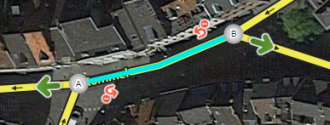(updated wiki link) |
Geen bewerkingssamenvatting |
||
| (14 tussenliggende versies door 3 gebruikers niet weergegeven) | |||
| Regel 1: | Regel 1: | ||
{{TopLine}} | |||
<languages /> | |||
==U-turn== | |||
[[File:U-turn-example.png|right|330px]] | |||
Two-way segments will also show the small U-turn arrow icon at both ends of the segment. This is used, as its name suggests, to prevent/enable Waze to use a segment end node as a U-turn, in case of necessity. <br /> | |||
<br /> | |||
The standard rule in the Netherlands: U-turns should be disabled: [[File:Wme_u-turn_restricted.png]].<br /> | |||
<br /> | |||
Keep in mind that Waze is used in all kinds of cars, big or small, driven by drivers of varying experience and talent, with or without a trailer. Also remember that we never know what the traffic situation is the moment a Wazer is driving somewhere.<br> | |||
We are therefore extremely reluctant to allow U-turns. And if we do that, then only in places where there is enough space to make a U-turn in one smooth movement. This is often only possible if there is a connecting segment of sufficient length between 2 roads.<br> | |||
===U-turns explained=== | |||
[[File:Wme_u-turn_allowed.png|left]] A curved green arrow indicates that a u-turn is allowed in the manner and direction indicated by the arrow at that end of the segment.<br /> | |||
<br /> | |||
[[File:Wme u-turn allowed hover clock.png]] When you hover the mouse over an allowed u-turn arrow, a small clock icon appears, which, when clicked on, allowed you to set scheduled u-turn restrictions, as well as vehicle type restrictions on the U-turn.<br /> | |||
<br /> | |||
[[File:Wme_u-turn_restricted.png]] A curved red arrow with the slashed-circle icon indicates that a u-turn is not allowed (is restricted) in the manner and direction indicated by the arrow at that end of the segment.<br /> | |||
<br /> | |||
[[File:Wme_u-turn_scheduled.png]] A curved yellow arrow with a clock icon indicates the presence of scheduled (time-based) turn restrictions for the direction indicated by the arrow at that end of the segment.<br /> | |||
<br /> | |||
==Remarks== | |||
* See for U-turn prevention the Road aspects page paragraph [[Road_Aspects#Double_left_and_double_right|Double left and double right]]. | |||
__NOTOC__ | |||
{{Bottomline}} | |||
Huidige versie van 15 sep 2021 om 10:06
U-turn

Two-way segments will also show the small U-turn arrow icon at both ends of the segment. This is used, as its name suggests, to prevent/enable Waze to use a segment end node as a U-turn, in case of necessity.
The standard rule in the Netherlands: U-turns should be disabled: ![]() .
.
Keep in mind that Waze is used in all kinds of cars, big or small, driven by drivers of varying experience and talent, with or without a trailer. Also remember that we never know what the traffic situation is the moment a Wazer is driving somewhere.
We are therefore extremely reluctant to allow U-turns. And if we do that, then only in places where there is enough space to make a U-turn in one smooth movement. This is often only possible if there is a connecting segment of sufficient length between 2 roads.
U-turns explained

A curved green arrow indicates that a u-turn is allowed in the manner and direction indicated by the arrow at that end of the segment.
![]() When you hover the mouse over an allowed u-turn arrow, a small clock icon appears, which, when clicked on, allowed you to set scheduled u-turn restrictions, as well as vehicle type restrictions on the U-turn.
When you hover the mouse over an allowed u-turn arrow, a small clock icon appears, which, when clicked on, allowed you to set scheduled u-turn restrictions, as well as vehicle type restrictions on the U-turn.
![]() A curved red arrow with the slashed-circle icon indicates that a u-turn is not allowed (is restricted) in the manner and direction indicated by the arrow at that end of the segment.
A curved red arrow with the slashed-circle icon indicates that a u-turn is not allowed (is restricted) in the manner and direction indicated by the arrow at that end of the segment.
![]() A curved yellow arrow with a clock icon indicates the presence of scheduled (time-based) turn restrictions for the direction indicated by the arrow at that end of the segment.
A curved yellow arrow with a clock icon indicates the presence of scheduled (time-based) turn restrictions for the direction indicated by the arrow at that end of the segment.
Remarks
- See for U-turn prevention the Road aspects page paragraph Double left and double right.